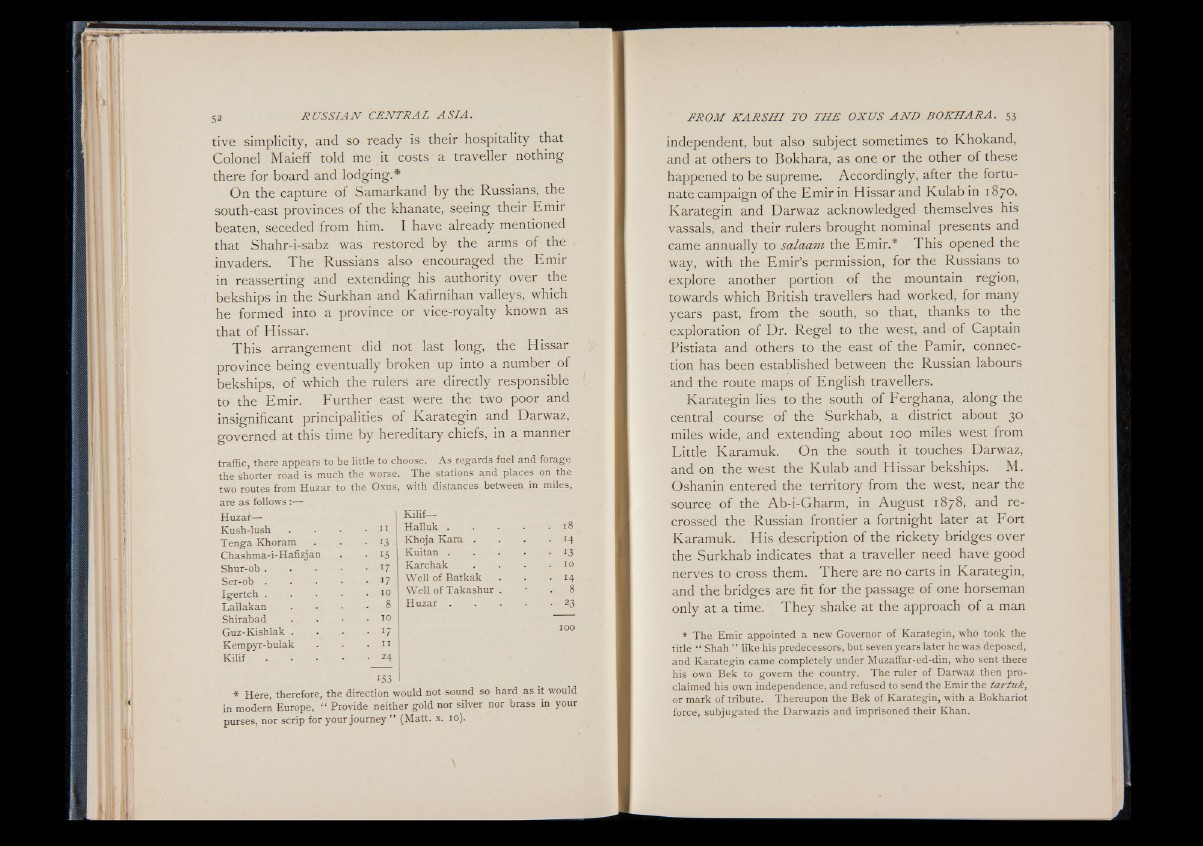
tive simplicity, and so ready is their hospitality that
Colonel Maieff told me it costs a traveller nothing
there for board and lodging.*
On the capture of Samarkand by the Russians, the
south-east provinces of the khanate, seeing their Emir
beaten, seceded from him. I have already mentioned
that Shahr-i-sabz was restored by the arms of the \
invaders. The Russians also encouraged the Emir
in reasserting and extending his authority over the
bekships in the Surkhan and Kafirnihan valleys, which
he formed into a province or vice-royalty known as
that o f Hissar.
This arrangement did not last long, the Hissar
province being eventually broken up into a number of
bekships, of which the rulers are directly responsible
to the Emir. Further east were the two poor and
insignificant principalities of Karategin and Darwaz,
governed at this time by hereditary chiefs, in a manner
forage
on the
miles,
traffic, there appears to be little to choose. As regards fuel and
the shorter road is much the worse. The stations and places
two routes from Huzar to the Oxus, with distances between in
are as follows :—
Huzat—
1 K i l i f —
Kush-lush
Tenga Khoram
Chashma-i-Hafizj a
Shur-oh .
Ser-ob .
Igertch .
Lailakan
Shirabad
Guz-Kishlak
Kempyr-bulak
Kilif
i I H a l l u k . . 1 8
1 3
K h o j a K a r a . - 1 4
I S
K u i t a n . • 1 3
1 7
K a r c h a k 1 0
1 7
W e l l o f B a t k a k • H
1 0 W e l l o f T a k a s h u r . . 8
8 H u z a r . • 2 3
1 0 — 1—
! 7
1 0 0
I I
2 4
1 5 3
* Here, therefore, the direction would not sound so hard as it would
in modem Europe, “ Provide neither gold nor silver nor brass in your
purses, nor scrip for your journey ” (Matt. x. 10).
independent, but also subject sometimes to Khokand,
and at others to Bokhara, as one or the other of these
happened to be supreme. Accordingly, after the fortunate
campaign of the Emir in Hissar and Kulab in 1870,
Karategin and Darwaz acknowledged themselves his
vassals, and their rulers brought nominal presents and
came annually to salaam the Emir.* This opened the
way, with the Emir’s permission, for the Russians to
explore another portion of the mountain region,
towards which British travellers had worked, for many
years past, from the south, so that, thanks to the
exploration of Dr. Regel to the west, and of Captain
Pistiata and others to the east of the Pamir, connection
has been established between the Russian labours
and the route maps of English travellers.
Karategin lies to the south of Ferghana, along the
central course of the Surkhab, a district about 30
miles wide, and extending about 100 miles west from
Little Karamuk. On the south it touches Darwaz,
and on the west the Kulab and Hissar bekships. M.
Oshanin entered the territory from the west,- near the
source of the Ab-i-Gharm, in August 1878, and recrossed
the Russian frontier a fortnight later at Fort
Karamuk. His description of the rickety bridges over
the Surkhab indicates that a traveller need have good
nerves to cross them. There are no carts in Karategin,
and the bridges are fit for the passage of one horseman
only at a time. T hey shake at the approach of a man
* The Emir appointed a new Governor of Karategin, who took the
title “ Shah ” like his predecessors, but seven years later he was deposed,
and Karategin came completely under Muzaffar-ed-din, who sent there
his own Bek to govern the country. The ruler of Darwaz then proclaimed
his own independence, and refused to send the Emir the tartuk,
or mark of tribute. Thereupon the Bek of Karategin, with a Bokhariot
force, subjugated the Darwazis and imprisoned their Khan.